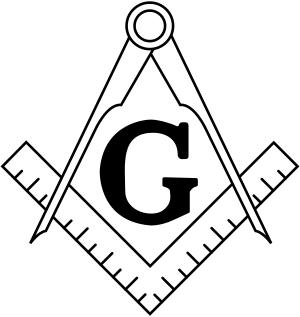 Image via Wikipedia
Image via WikipediaTwo purposes are served by the Volume of the Sacred Law in a Masonic Lodge. It shows that Masonic ritual and teaching are based on the Bible, and it provides an appurtenance to enable the taking of a solemn obligation. For a Christian the two purposes coalesce, since the VSL placed on a Lodge room pedestal (in some places still called the altar) is generally the King James Version containing both Old and New Testaments, though the effect would be the same with a different translation. For a Jew, a volume with the New Testament presents a problem when he takes an obligation, and for this purpose a Jewish candidate would probably want the Hebrew Scriptures, Genesis to Malachi, or the Pentateuch. This means placing two sacred books on the pedestal – the King James Old and New Testament as the “official” VSL and a separate Jewish Bible for the obligation (Israeli Lodges have a third book, the Koran). It is highly unusual for a Jewish Master or Mason to object to the presence of the New Testament on the Lodge pedestal, knowing that the VSL passages which are read generally come from the Hebrew Scriptures. As a private matter, a Jewish Master will occasionally have his own Hebrew volume on display or at least at hand on his Master’s pedestal; one Master I knew always had beside him a miniature Hebrew scroll of the Pentateuch.
Non-Biblical faiths have a problem with both the Old and New Testaments, but candidates or Masons from such faiths cannot dispense with the VSL since this is the basic document which shaped Masonic ritual (in some cases it may be the Lodge which provides a Mason’s Biblical education). A person can use his own holy book (e.g. the Koran) for the personal obligation. The procedure they use is whatever is customary in their own tradition (holding the book, placing their hand on the book, holding the book over their head, etc.). It is not the role of Freemasonry to try to reconcile possible contradictions between the Bible and other sacred literature, whether it be the Koran (Muslim), Sri Guru Granth Sahib (Sikh), Bhagvada Gita (Hindu), Khordeh Avesta (Parsee), Dhammapada (Mahayana Buddhist) or other text.
Why is the Bible called the VSL, bearing in mind that Biblical literature is far more than law? The conventional terminology indicates the authoritative status we ascribe to Biblical ethics, though there is a difference between the ethics of Judaism and Christianity and the popular slogan, “the Judeo-Christian ethic”, is something of a myth.

No comments:
Post a Comment